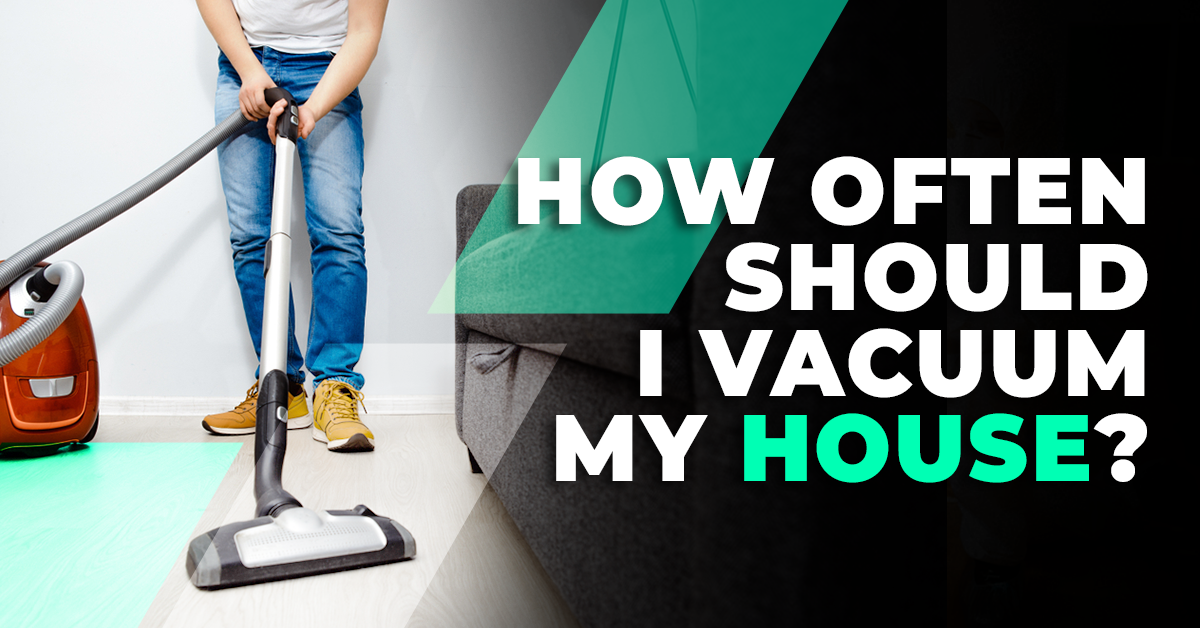Licensed And Insured

How Often Should I Vacuum My House?
Do you ever feel that cleaning your house is a never-ending chore that only lasts a short while? Many homeowners and renters who wish to keep their homes clean and healthy experience this typical problem.
With so many competing demands on our time and energy, it can be difficult to know how often to tackle certain cleaning tasks, like vacuuming.
In this post, we’ll examine many people’s questions: “How often should I vacuum my house?” Whether you’re dealing with allergies or respiratory issues or want to keep your home looking and feeling its best, we’ll provide practical tips and advice for incorporating vacuuming into your cleaning routine. So, let’s dive in!
The benefits of vacuuming go beyond just cleanliness and air quality. Here are the key points about the importance of vacuuming –
- Vacuuming helps remove dirt, dust, and debris from floors and carpets, as well as allergens like pet dander, pollen, and dust mites.
- Regular vacuuming can improve the air quality in your home, which is especially important for those with allergies or respiratory issues.
- It can help extend the life of your carpets and flooring by removing dirt and debris that can wear down fibers over time.
- It can be a form of exercise, particularly if you use an upright or canister vacuum that requires you to push and pull the machine around your home.
- Regular vacuuming as part of your cleaning routine can help you maintain a cleaner, healthier, and more comfortable living environment.
In short, vacuuming is an essential component of any cleaning routine and can help improve the look and feel of your home. By incorporating regular vacuuming into your cleaning routine, you can enjoy a cleaner, healthier, and more comfortable living environment.

Benefits of Maintaining a Clean Home
Maintaining a clean home is more than having a tidy living space. It may benefit both your physical and emotional health and the ambiance of your house as a whole.
The benefits of keeping a clean house include the following: less stress. You may feel less worried and more at ease when your home is neat and orderly.
- Reduced stress: When your home is clean and organized, it can help you feel more relaxed and less stressed. Mess and clutter can create a sense of chaos and overwhelm, which can take a toll on your mental health.
- Improved physical health: A clean home can help to reduce the amount of dust, dirt, and allergens in your living environment, which can have a positive impact on your respiratory and immune systems. This can be especially important for individuals with allergies, asthma, or other respiratory issues.
- Enhanced productivity: When your home is clean and organized, you may be better able to focus and be productive. Clutter and mess can be distracting and make it difficult to stay on task.
- More enjoyable living space: A clean home feels more inviting and comfortable than a cluttered or dirty one. When your home is clean and well-maintained, you may enjoy more time there, whether relaxing or entertaining guests.
Overall, keeping your house clean may improve your physical and mental health and overall quality of life. You can enjoy a comfortable, healthier living environment by prioritizing regular cleaning and organization.

Factors to Consider When Determining Vacuuming Frequency
It’s essential to consider several factors that can influence the buildup of dirt and debris to determine how frequently you should vacuum your home. Here are the most significant factors you should keep in mind:
- Lifestyle and habits: Your daily habits and lifestyle can significantly affect the cleanliness of your home. If you have young children who crawl or play on the floor, or if you entertain guests frequently, your home may accumulate dirt and debris more quickly and thus require more frequent vacuuming.
- Family size: The number of people in your household can also impact how frequently you should vacuum. More people in the home mean more foot traffic, which leads to a higher volume of dirt and debris and more wear and tear on your carpets and flooring.
- Pets: If you have pets, particularly those that shed hair or dander, you’ll likely need to vacuum more often to keep up with the mess they leave behind. Pet hair and dander can accumulate quickly and trigger allergies or other respiratory issues if not removed regularly.
- Flooring type: When determining how often to vacuum your home, it’s important to take into account the type of floors you have. Carpeted floors trap more dirt and dust than hard surfaces and thus may require more frequent vacuuming. Hardwood, tile, or laminate floors may only require occasional vacuuming to remove loose dirt and debris.
- Environmental factors: Environmental factors like air quality, humidity, and outdoor pollution can also impact how quickly dirt and debris accumulate in your home. If you live in an area with high levels of pollution or frequently open windows and doors, you may need to vacuum more often to maintain a clean and healthy living environment.

Other Areas of the Home
It’s important to consider how frequently you should vacuum your home and which rooms you should concentrate on. Here are some guidelines for how often you should vacuum different areas of your home:
- Bedrooms: Depending on the above factors, you may need to vacuum your bedrooms once or twice a week to keep them clean and dust-free. If you have pets that spend time in your bedrooms or if anyone in your household suffers from allergies, you may need to vacuum more frequently.
- Living areas: The living room, family room, and other common areas of your home tend to get a lot of foot traffic, leading to a buildup of dirt and debris. It’s generally recommended to vacuum these areas at least once a week or more frequently.
- Formal dining rooms: Formal dining rooms should also be included in your regular vacuuming routine, especially if they are used frequently or have carpeted floors. Depending on the frequency of use and foot traffic, you may need to vacuum them once a week or more regularly to keep them clean and free of dirt and debris. Again, consider using the best robotic vacuum cleaner to make the task easier and more convenient.
- Guest rooms: If you have guest rooms in your home, it’s important to vacuum them regularly, especially if they are not frequently used. Aim to vacuum these rooms at least once a month to keep them clean and free of dust and allergens.
- Stairs: Stairs are often overlooked when it comes to vacuuming, but they can accumulate a surprising amount of dirt and debris. It’s a good idea to vacuum your stairs at least once weekly to keep them deep clean and prevent buildup.
- Curtains and blinds: Curtains and blinds can also accumulate dirt and debris over time. Vacuuming them at least once a month, or more frequently, if you have pets or allergies is recommended.

Signs that You Should Vacuum More Often
While the factors mentioned earlier can give you a general idea of how often should I vacuum your home, some signs to watch out for may indicate that you need to vacuum more frequently. Here are some of the most common signs:
- Allergies: If you or someone in your household suffers from allergies, you may notice that symptoms like sneezing, coughing, and itchy eyes become more frequent when your home is not clean. This could indicate that you must vacuum more often to remove dust, pollen, and other allergens from your living space.
- Persistent odors: If you notice persistent odors in your home, even after cleaning, it may be a sign that dirt and debris are hiding in your carpets or other areas that must be addressed. Vacuuming more frequently can help remove these hidden odor sources and keep your home smelling fresh.
- Visible debris: Finally, if you can see visible debris on your floors, carpets, or other surfaces, it’s a clear sign that you need to vacuum more often. This could include things like pet hair, crumbs, or dirt and dust accumulated in high-traffic areas of your home.

Tips for Maintaining Your Vacuum
If you’re still wondering, “how often should I vacuum?” the answer depends on several factors, including –
- Regular cleaning and maintenance: Like any other appliance or tool, your vacuum cleaner needs regular cleaning and maintenance to maintain good working conditions. This includes emptying the dustbin or replacing the bag, cleaning the filters, and checking for clogs or blockages.
- When to replace filters and bags: Depending on your vacuum type, you may need to replace the filters or bags regularly to ensure that your vacuum works effectively. Check the manufacturer’s recommendations to determine when these components should be replaced, and keep a supply on hand, so you’re always ready to swap them out as needed.
- Vacuum storage: When you’re not using your vacuum, it’s important to store it properly to prevent damage and prolong its lifespan. This could mean using a storage bag or cover to protect it from dust and debris or finding a dedicated storage space in your home where it won’t get bumped or knocked over.
Wrapping UP
Vacuuming regularly is important for a clean and healthy home. Consider your lifestyle, family size, pets, flooring, and environmental factors to determine how often you should vacuum. Also, remember to maintain your vacuum by cleaning it and replacing filters and bags.
If you are still wondering how often should I vacuum and need expert help, Spotless Magic World offers professional cleaning services using eco-friendly products. For more information, check our website and compare on your own!




